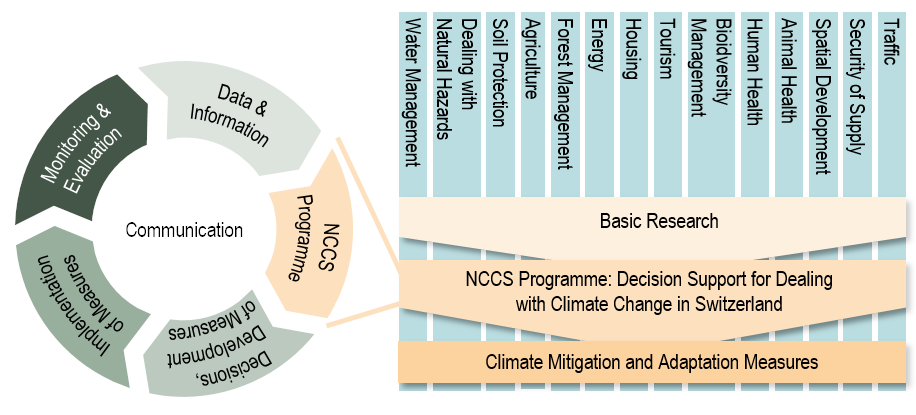In the NCCS programme «Decision Support for Dealing with Climate Change in Switzerland: a cross-sectoral approach» («NCCS-Impacts»), actionable climate services for the environment, economy and society will be developed from 2022 to 2026.

The effects of climate change in Switzerland are already visible today and affect different sectors. According to the current climate change scenarios, climate change will continue unchecked without countermeasures to avoid global greenhouse gas emissions. The NCCS-Impacts programme develops user-oriented climate services as decision support for planning in the field of climate change mitigation and adaptation. The programme is jointly supported by all NCCS members and runs until the end of 2026.
Projects and results
Between 2022 and 2025, several cross-sectoral and interlinked projects were implemented. Each project was carried out by a consortium comprising partners from research and practice. A total of 17 organisations were involved in the implementation of the five projects. The results will be published continuously over the coming months at the following links:
- Project "Socioeconomic scenarios"
- Project "Global impacts"
- Project "Ecosystem services"
- Project "Human health and animal health"
- Project "Costs of climate change"
To ensure the successful implementation of climate impact projects, an additional project led by MeteoSwiss focused on the processing and provision of climate information.
The individual project results will be bundled in a comprehensive overview at programme level, which will consolidate and classify the findings and highlight cross-sectoral connections. The overview will be published in autumn 2026.
Another longer-term project is investigating the vulnerability of the energy system to technical, natural and social hazards. This project is being carried out as a joint activity between NCCS-Impacts and the SWEET funding programme of the Swiss Federal Office of Energy (SFOE).
Goals of NCCS-Impacts
The NCCS-Impacts programme pursues three overarching goals:
- systemic overview of the impacts of climate change on and in Switzerland and its key challenges for the environment, economy and society;
- broad availability and use of jointly produced climate services for the targeted and sustainable management of the risks and opportunities of climate change; and
- cross-sectoral support of the Confederation and all stakeholders in their future-oriented actions to address the challenges of climate change.
The programme hence contributes to closing the gap identified between basic scientific research and measures in the fields of climate adaptation and climate mitigation.
Last modification 23.02.2026







